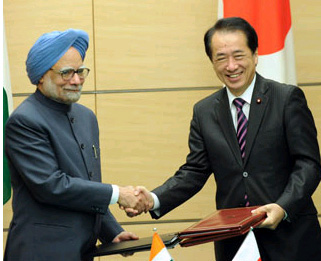India and Japan PMs confirm trade pact, discuss nuclear deal
India and Japan's premiers on Monday said they had broadly agreed on a pact to step up trade between the population giant and the high-tech nation but needed time for a deal on civilian nuclear cooperation.
India's Prime Minister Manmohan Singh and his counterpart Naoto Kan also stressed the warm ties linking two of Asia's biggest democracies, at a time of high diplomatic tensions between Japan and communist-ruled China.

India's Prime Minister Manmohan Singh (L) shakes hands with Japanese Prime Minister Naoto Kan following the signing of a bilateral agreement at the latter's official residence in Tokyo.
Kan said after talks with Singh, who was on a three-day Tokyo visit, that "through this meeting, we were able to confirm and be confident about progress in the strategic global partnership between Japan and India".
The two leaders declared the completion of talks on a free trade and investment pact, with a formal signing expected in coming months, under which tariffs on 94 percent of trade would be phased out within a decade.
The deal will help Japanese auto giants, such as Suzuki, who have opened plants in India by lifting tariffs on parts, while also easing access to the market in fast-greying Japan for Indian generic drugs.
"We signed a joint statement confirming the conclusion of negotiations on a Comprehensive Economic Partnership Agreement between Japan and India," said Kan after a meeting with Singh.
Singh called the conclusion of talks launched in 2007 "a historic achievement" which would "open up new business opportunities".
They also agreed to cooperate in fields as diverse as stabilising Afghanistan, combating climate change, safeguarding biodiversity, and pushing UN reforms and global free trade efforts, a joint statement said.
However another key deal sought by New Delhi, on civilian nuclear cooperation, remained beyond reach with the leaders only saying they encouraged their officials "to arrive at a mutually satisfactory agreement... at an early date".
Japan and India launched negotiations in June on a pact that would allow Tokyo to export its cutting-edge nuclear technology to the energy-hungry South Asian nation, a hotly contested market for atomic plants.
But Japan - the only country to have suffered atomic bombings and a key voice in global denuclearisation efforts - is worried that nuclear-armed India has not signed the Nuclear Non-Proliferation Treaty.
The start of talks on civilian nuclear cooperation brought cries of protest in Japan from survivors of the US atomic bombings of the cities of Hiroshima and Nagasaki in the final days of World War II.
Kan said that "we agreed to speed up negotiations for civil nuclear energy cooperation, while seeking India's understanding of our country's sentiment as a nuclear-bombed nation".
Singh "reiterated India's commitment to a unilateral and voluntary moratorium on nuclear explosive testing" and both sides "underscored the importance of peaceful uses of nuclear energy and of further strengthening the nuclear non-proliferation efforts," their joint statement said.
Japan - which was eclipsed this year by China as Asia's biggest economy and has a shrinking population because of its low birth rate - is searching for new markets, especially the emerging giants China and India.
Ties between Tokyo and Beijing have however sharply deteriorated following Japan's September 8 arrest of a Chinese fishing boat captain near a disputed island chain in the East China Sea.
Beijing has reacted furiously, cancelling high-level talks and civilian exchanges as well as suspending exports of rare earth minerals, which are crucial for Japan's high-tech industries.
In their statement, the premiers "decided to explore the possibility of bilateral cooperation in development, recycling and re-use of rare earths and rare metals and in research and development of their industrial substitutes."
Singh was Tuesday due to meet Japanese parliamentarians, then travel to Malaysia and later Vietnam, where Southeast Asian leaders will meet the premiers of China and Japan for a summit at the end of the week.
AFP/ac/de

